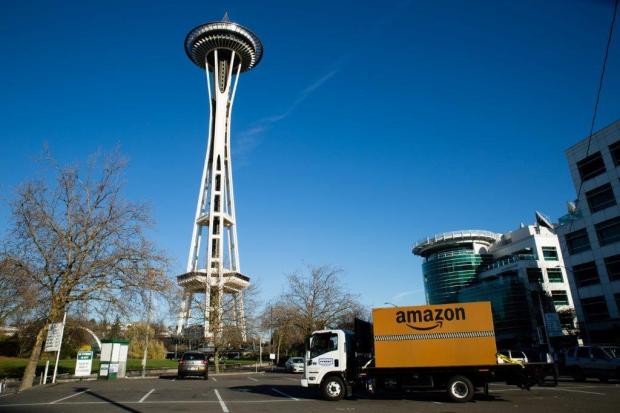OK, so maybe it’s corrugated cardboard.
But last week, Amazon launched a promotion that started in Seattle and San Francisco and is expected to fan out to 15 other locales during this holiday season, according to GeekWire.
It’s fascinating that last week in this blog, we discussed how Jeff Bezos is bringing new thinking to traditional media, specifically his bold purchase of The Washington Post.
And this week, Amazon is pulling off a reversal of sorts – launching an old school radio contest for a new media company.
It makes you think that a young Jeff Bezos growing up in Albuquerque must have spent time wondering what was in the quintessential “black box” when that contest undoubtedly ran on a hometown station.
Contesting on the radio has always had its share of doubters. Research shows that a rather small percentage of the audience actually participates. Yet, there’s this intrinsic belief that these giveaways drive ratings, bolstered by the notion that contest players share some of the same characteristics of diarykeepers or meter carriers.
But great contests bring benefit far beyond the nuts and bolts of who’s actually playing them. They can provide excitement, create talk and PR, and even controversy at times. And then there’s all those people who vicariously play along, even if they’re not going to call in, text, or go online to win.
Amazon’s promotion is a reminder to all of us in radio that some of those old promotions from the bygone days that captivated consumers then – can still do so now. The best giveaways generated buzz, word of mouth, and speculation in much the same way this Amazon stunt is being talked about online.
From “Cash Call” to “Christmas Wish” to “The Birthday Game, these evergreen contests and promotions worked because they engaged our imaginations and gave us something to talk about. And yet, it’s ironic how many of these legendary contests would be rejected as tired and dated in modern marketing brainstorm sessions. As Saga’s Steve Goldstein is fond of saying, “That promotion worked so well that we stopped doing it.”
Back when I was teaching radio production at Michigan State, one of my students from Chicago told the story of calling home on a Sunday night, only to have his mother answer the phone, “WMAQ’s gonna make me rich.”
He couldn’t believe that a banal radio contest could so captivate his smart, sophisticated mom, along with thousands of other Chicagoans.
Of course, some guy named Bob Pittman was programming the station at that time.
So what do you think is in the box?
Thanks to radio pro Tony Thomas for the heads-up on this story.
- What To Do If Your Radio Station Goes Through A Midlife Crisis - April 25, 2025
- A 2020 Lesson?It Could All Be Gone In A Flash - April 24, 2025
- How AI Can Give Radio Personalities More…PERSONALITY - April 23, 2025






Great piece on contesting, Fred.
All great contests in radio have ALWAYS been about imaging the station and creating talk.
In the 1980s, when we started focusing on using contests to force TSL, most contesting lost that image/causing talk-focus. Programmers focused much more on the “science” of running a contest, appointment promos etc. and the truly creative people on staff were eased out of the building process. The result is contests that are so difficult for listeners to understand, they don’t care very much.Now, most hourly giveaways are a snooze and when a station does do something larger, they often rip an old contest off with any effort to update or improve it’s creativity. Radio became brilliant at Charity promotions from the late 90s on, and many of them were excellent ways to build an image, spotlight your on-air talent and build clients relationships. PPM changed all that and now they are inefficient and dreaded by all concerned.When you consider all the conversations we’re having today about keeping radio RELEVANT, contesting is an excellent opportunity to do something which the Web and digital outlets cannot come close to matching. But you HAVE TO get the creative people back in the room and kick fear out of the meeting.
Jim, you’re right that modern radio (and PPM has been a part of the story). At their best, contests, promotions, and charitable/community events have benefit to audience building, as well as branding and imaging. And too often, stations no longer have the bandwidth to brainstorm, much less execute creative promotions. And many cannot even embark on these activities there is guaranteed ROI for them – often at multiples of their costs. These policies subdue the process. Thanks for the perspective and for taking the time.